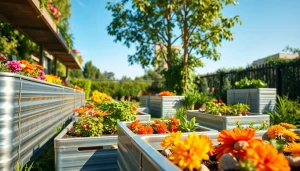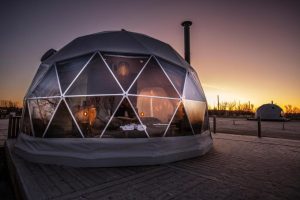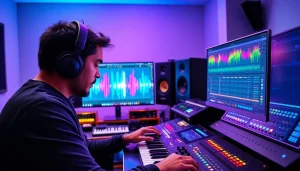Enhancing Space Utilization with Folding Partition Walls: A Comprehensive Guide

Understanding Folding Partition Walls
What are Folding Partition Walls?
Folding partition walls are versatile space management solutions designed to create flexible environments in both commercial and residential settings. Often constructed from lightweight materials, these walls can be easily collapsed or expanded, allowing for quick reconfiguration of spaces without requiring significant structural modifications. Commonly used in offices, schools, and event venues, folding partition walls facilitate the division and reallocation of space, enabling efficient use of areas depending on specific needs.
These walls offer a variety of styles and materials, whether for aesthetic purposes or functional needs. A prevalent choice among architects and facility managers, they stand out for their acoustic properties, which can help minimize noise disruption between rooms, making them ideal for multi-use environments. For in-depth options on Folding Partition Wall systems, various manufacturers provide custom solutions tailored to specific space requirements.
Benefits of Using Folding Partition Walls
The use of folding partition walls comes with numerous benefits, each contributing to enhanced space utilization:
- Flexibility: The primary advantage is the ability to quickly adjust room layouts, accommodating changing needs for different events or activities.
- Space Optimization: They allow for maximum usage of floor space by creating areas that can be transformed based on real-time requirements, thus avoiding wasted square footage.
- Cost-Effectiveness: Instead of constructing permanent walls, which can be expensive, folding partitions provide a more budget-friendly solution for creating adaptable spaces.
- Sound Insulation: High-quality folding partition walls offer different levels of sound control, ensuring privacy and concentration, especially in professional settings.
- Aesthetic Appeal: Available in various styles and finishes, they enhance the overall look of a space while serving functional purposes.
Common Applications for Folding Partition Walls
Folding partition walls are adaptable and can be found in multiple scenarios:
- Offices: They are frequently used to create temporary meeting rooms or collaborative spaces within larger office areas.
- Schools: Classrooms can be divided or combined based on the requirements of different educational groups or activities.
- Conference Centers: Folding walls facilitate the setup of varying room sizes for different events, maximizing revenue by accommodating diverse group sizes.
- Hotels and Restaurants: Provide flexibility for banquet halls and dining areas to adapt to event sizes, offering more personalized experiences to guests.
- Auditoriums: They are used to subdivide larger spaces for different performances or workshops, enhancing venue utility.
Types of Folding Partition Walls
Accordion vs. Bi-Fold Partition Walls
There are primarily two types of folding partition walls commonly used: accordion and bi-fold.
- Accordion Partition Walls: These are composed of multiple sections that fold into an accordion-like design. They are often chosen for their ease of operation and the ability to create wide openings without permanent boundaries. Their installation requires less space when collapsed, making them ideal for smaller areas.
- Bi-Fold Partition Walls: Characterized by two-panel systems that fold in half when opening, bi-fold partition walls provide a stylish and compact solution, suitable for settings where aesthetics are crucial. They are generally more robust and can offer better sound insulation when sealed.
Material Choices for Folding Partition Walls
Choosing the right material for folding partition walls affects both functionality and style. Common materials include:
- Wood: Provides a classic look and can be finished in various veneers to match interior decor.
- Metal: Durable and modern, metal options can offer a sleek finish and are easy to maintain.
- Fabric: Often used in acoustical applications, fabric-covered partitions can help minimize sound transfer while adding aesthetic value.
- Glass: Offers transparency and natural light flow while maintaining a level of sound control. Glass options are increasingly popular in contemporary designs.
Acoustic Performance in Folding Partition Walls
One of the most critical factors in choosing folding partition walls is their acoustic efficiency. Acoustic performance refers to how well a partition can isolate sound, which is particularly important in environments such as offices or schools. Various materials can be integrated into the partition design to enhance sound insulation, including acoustic fabrics, dense cores, and specialized sound-dampening components. When evaluating options, consider factors such as:
- STC Ratings (Sound Transmission Class): This rating indicates how effectively a partition blocks sound, with higher ratings indicating better performance.
- Installation Quality: Proper installation can significantly affect acoustic performance, emphasizing the importance of professional setup.
- Design Choices: Options such as seals and edges can help minimize sound leaks between adjoining panels and around the perimeter.
Choosing the Right Folding Partition Wall
Factors to Consider When Selecting a Folding Partition Wall
When choosing a folding partition wall, several criteria should be carefully evaluated. Key considerations include:
- Space Requirements: Assess your available space to determine the type and size of the folding partition wall that will best suit your layout.
- Usage: Consider the frequency with which the partition will be moved, as different types (accordion vs. bi-fold) are suited to various operational needs.
- Sound Privacy Needs: Evaluate the level of acoustic performance necessary for your environment, determining if basic sound control or advanced insulation is needed.
- Aesthetics: The design should complement the existing decor while meeting functional requirements.
- Budget: Set a budget that allows for quality products while also considering installation costs and potential long-term savings.
Custom Solutions vs. Standard Products
Businesses and homeowners can choose between custom solutions and standard folding partition wall products. Standard options are readily available and can be more cost-effective but may not fit all spatial or aesthetic requirements perfectly. Custom solutions provide more flexibility, allowing for specific dimensions, materials, and finishes tailored to your needs. When deciding, consider:
- Timeframe: Custom solutions may take longer to manufacture and install, which can impact project timelines.
- Functional Requirements: Evaluate if the standard options sufficiently meet operational needs, or if a custom design would provide enhanced utility.
- Aesthetic Needs: Custom solutions can allow for unique finishes that standard products may not offer, helping align the design with specific themes.
Cost Considerations for Folding Partition Walls
The cost of folding partition walls can vary widely based on materials, design, and installation. To budget effectively, consider the following:
- Material Choice: More premium materials may increase overall costs. Assess the long-term benefits versus initial expenditures.
- Size and Complexity: Larger and more complex installations will generally incur higher costs. Evaluate the necessary dimensions and functionalities upfront.
- Installation Costs: Factor in professional installation fees if not opting for a DIY approach, as quality installation significantly impacts performance and durability.
Installation and Maintenance Tips
Professional Installation vs. DIY
While installing folding partition walls may seem feasible as a DIY project, professional installation offers several benefits:
- Expertise: Professionals understand the nuances of installation that can affect acoustics, functionality, and aesthetics.
- Warranty and Support: Many manufacturers offer warranties on professionally installed products, which may not apply to DIY installations.
- Time Efficiency: Professionals can often complete installations faster, reducing downtime in commercial settings.
For those who choose the DIY route, be sure to carefully read the installation manual and perhaps consult online tutorials to ensure a successful setup.
Maintenance Best Practices for Folding Partition Walls
To ensure longevity and performance, regular maintenance is crucial for folding partition walls. Best practices include:
- Routine Inspections: Check for signs of wear, including any damage to panels or locks, and address issues promptly to prevent larger problems.
- Cleansing: Regularly clean both the surfaces and tracks to prevent buildup that could impair function.
- Lubrication: Lubricating the folding mechanisms can maintain ease of operation and prevent wear.
Common Issues and Their Solutions
Despite careful selection and installation, users may encounter common issues with folding partition walls, including:
- Alignment Problems: If walls do not align properly, inspect and adjust mounting brackets or call for professional assistance.
- Noise Leaks: If acoustics are insufficient, consider adding sound-dampening materials or upgrading the partition system.
- Stains or Damages: Address any physical damages immediately to prevent further deterioration. Frequent cleaning can also prevent staining.
Future Trends in Folding Partition Walls
Innovative Designs in Folding Partition Walls
The world of folding partition walls is evolving, with innovative designs prioritizing both functionality and aesthetic appeal. Trends include:
- Modular Wall Systems: These systems allow for greater flexibility and customization, accommodating various room shapes and sizes.
- Integration with Technology: Smart systems that integrate electronic mechanisms can automate wall movement and offer smart sound control features.
- Sustainable Materials: Increasingly, designers are opting for eco-friendly materials that appeal to environmentally conscious businesses.
Smart Technology Integration in Partition Solutions
As technology advances, folding partition walls are beginning to incorporate smart features. Potential developments include:
- Automated Movement: Some partitions can be controlled via smartphone apps, enabling effortless setup from anywhere in the space.
- Sensor-Based Deployment: Sensors may enable partitions to move based on the number of occupants in a space, maximizing utility and efficiency.
- Integrated Sound Equipment: Future partitions might include built-in sound systems, allowing for streamlined audio management in multipurpose areas.
Environmental Considerations for Folding Partition Walls
Environmental concerns are increasingly influencing design choices within the folding partition wall industry. Factors that manufacturers and consumers should embrace include:
- Recyclable Materials: Sourcing materials that can be recycled at the end of their lifecycle contributes to sustainable practices.
- Energy Efficiency: Preferring partitions that enhance natural light flow can reduce energy consumption in buildings.
- Responsible Sourcing: Opting for materials sourced from renewable resources minimizes environmental impact.







